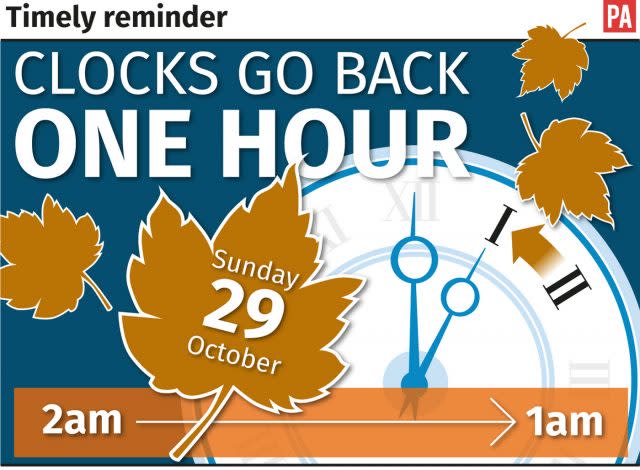Have you clocked it? Extra nap boosts brain power

Brits will be able to enjoy an extra hour under the duvet on Sunday when the clocks go back at 2am - and health and cognitive bonuses - according to sleep experts.
As Daylight Saving Time ends, the UK will switch from British Summer Time (BST) to Greenwich Mean Time (GMT), heralding the start of lighter mornings but darker evenings.
But according to Professor Matthew Walker, director of the Centre for Human Sleep Science at Berkeley California, a small boost to our nightly slumber can also improve memory and increase learning capacity.

Prof Walker, who recently published his book Why We Sleep, drawing on 20 years of research and findings from his laboratory, said: "Just 60-90 minutes of additional sleep boosts the learning capacity of the brain, significantly increasing memory retention of facts and preventing forgetting."
In a study published six years ago in Current Biology, Prof Walker, along with a team of other researchers, demonstrated that during a demanding memorising task, test subjects who were allowed extra nap time performed better than those who did not.
They found the brain's ability to learn was linked to sleep spindles - which are fast pulses of electricity generated during REM (rapid eye movement) sleep, which accounts for 25% of total sleep time in adult humans.
Spindle-rich sleep, which is said to occur in the second half of the night, helps with the brain's ability to create new memories by "clearing a path to learning".
But it's not just about improved brain power.
Thanks to The Atlantic @TheAtlantic for this book review #WhyWeSleep Hope the book lives up to the article title! https://t.co/to1oWUGWqk
-- Matt Walker (@sleepdiplomat) October 25, 2017
Experiments conducted in 2013 by the Surrey Sleep Centre and the BBC showed a link between an extra hour in bed and genetic expression that helps protect against illnesses such as diabetes, cancer, inflammation and stress.
Scientists at the centre in Guildford divided the participants into two groups. During the first week, one group slept for six-and-a-half hours a night while the other had seven-and-a-half hours of shut-eye. The volunteers then switched their sleep patterns in the second week.
The researchers found that those who had less sleep struggled with mental agility tasks.
Blood tests revealed that genes associated with processes such as inflammation, immune response and response to stress became more active for those who had less sleep.
The activity of genes associated with heart disease, diabetes and risk of cancer also increased.
They found the reverse happened when the volunteers slept for an extra hour.
Meanwhile, other studies have linked extra sleep time a lower risk of heart disease.
(function(i,s,o,g,r,a,m){i['GoogleAnalyticsObject']=r;i[r]=i[r]function(){(i[r].q=i[r].q[]).push(arguments)},i[r].l=1*new Date();a=s.createElement(o),m=s.getElementsByTagName(o)[0];a.async=1;a.src=g;m.parentNode.insertBefore(a,m)})(window,document,'script','//www.google-analytics.com/analytics.js','ga');ga('create', 'UA-72310761-1', 'auto', {'name': 'pacontentapi'});ga('pacontentapi.set', 'referrer', location.origin);ga('pacontentapi.set', 'dimension1', 'By PA Reporters');ga('pacontentapi.set', 'dimension2', 'e624e4b2-c17d-49cd-815f-0e6805c3a3c5');ga('pacontentapi.set', 'dimension3', 'paservice:news,paservice:news:uk');ga('pacontentapi.set', 'dimension6', 'story-enriched');ga('pacontentapi.set', 'dimension7', 'composite');ga('pacontentapi.set', 'dimension8', null);ga('pacontentapi.set', 'dimension9', null);ga('pacontentapi.send', 'pageview', { 'location': location.href, 'page': (location.pathname + location.search + location.hash), 'title': 'Have you clocked it? Extra nap boosts brain power'});


